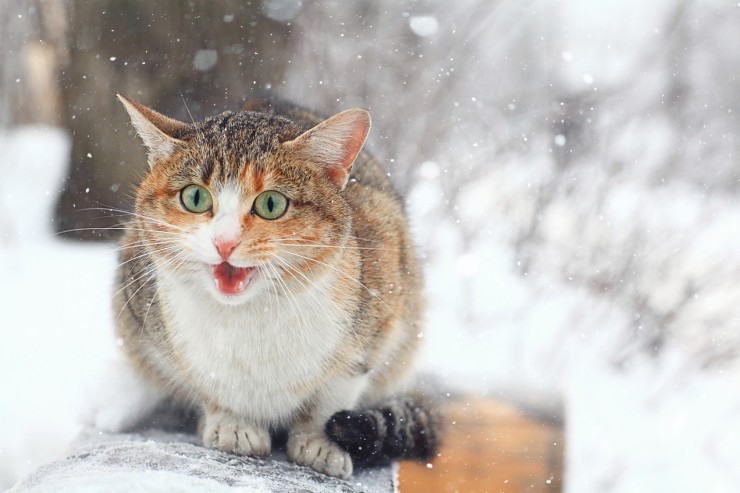

With summer fast disappearing and the autumn setting in, the cooler weather means our pets need a little more in the way of care and attention. Cats in particular love spending time in the great outdoors if they are allowed to and they get used to being out when the weather is warm, so when things start to cool down it can be a bit of worry when they decide to stay out all night.
It goes without saying that indoor cats don't run the many risks of being hurt which their outdoor cousins tend to do, but for people who live in the countryside it can prove very hard to keep their pets indoors all of the time. As such many cats do spend the whole night outside chasing down rodents and other prey which leaves them a little vulnerable should the outdoor temperature suddenly drop to below freezing and things start to freeze.
Cats just like people can get caught out by the weather and if they cannot get back in the house, they will find a sheltered spot to get out of the worst of it. However, it still leaves them very vulnerable to the cold temperatures which can result in them suffering from frostbite, a very painful condition that needs careful veterinary attention sooner rather than later.
The term frostbite refers to a condition where skin tissue is damaged due to the fact it's been exposed to extreme cold temperatures. If a cat is out of the wind in a dry spot and they are very healthy animals, they can withstand incredibly low temperatures really well. However, if they cannot find a sheltered spot or if they are injured or weak in any way, they become very vulnerable and therefore they can suffer from a condition called hypothermia and their extremities become frozen which in short means they have suffered frostbite. Symptoms of hypothermia include the following:
If you find your cat outside after an extremely cold night and they display any of the above symptoms, the first thing you have to do is warm them up slowly by wrapping them in blankets and to gently massage their body. The one thing you must never do is warm your pet up too quickly and you should never put them in warm water because this is the worst thing you could do for them. The next thing to do is get your cat to the vet as a matter of urgency explaining to them on the telephone what you think has happened so they are prepared for when you arrive at the surgery with your pet.
The vet would typically check your pet's glucose levels and then put them on warm IV fluids to help speed up their recovery. They would also administer warm enemas which are very effective at warming up a cat's core body temperature rather than just their outer skin. The next thing they would need to check is whether or not your cat has suffered any frostbite which would only really be noticeable around 48 hours later which is when any damaged tissue starts to swell up. Once this happens it is very painful due to the fact that no blood is getting to the nerves which results in skin tissue turning black. If the tissue is severely affected, it will fall off at a later date which can be anything from twenty to thirty days further down the line.
Your cat may have just suffered minor frostbite on the tips of their ears, which is typically the area of their body that normally gets affected. However, if the condition is more severe, you may find they could lose a toe or two, it might mean they lose a bit of their tail in very extreme cases. It's really important for the frostbite to be treated by the vet who would typically give your pussy cat a course of antibiotics so that no infection gets a chance to set in which could lead to secondary life threatening health issues. At the same time as treating the frostbite, the vet would be able to give your cat much needed pain relief medication to make them more comfortable until they have fully recovered and might even suggest keeping them at the surgery until they do.
When the weather turns really cold, it’s best to keep cats indoors where it’s nice and warm. However, cats being cats often want to go out in the evening and sometimes they don’t come back in for the whole night. It can be very worrying when your cat stays out all night when the temperatures are very cold and you may find that when they do reappear, they are very cold. If you suspect your cat has a touch of frostbite, you need to slowly warm them up using blankets and towels before getting them to the vet for a thorough check-up. Frostbite doesn’t show itself straight away but only really becomes noticeable around 48 hours later which is something you need to bear in mind when you take them to the vet.
 Ten Ways To Reduce Motion Sickness In The Dog Without Medications
Ten Ways To Reduce Motion Sickness In The Dog Without Medications
 4 Mistakes You Should NEVER Do When Trying To Stop Dog Barking
4 Mistakes You Should NEVER Do When Trying To Stop Dog Barking
 Canine Nutrition & Reproduction
Canine Nutrition & Reproduction
 A Guide to Healthy Pets:7 Must-Haves for Your Dogs
A Guide to Healthy Pets:7 Must-Haves for Your Dogs
 Making Sure Chinchillas Stay Happy & Healthy
Making Sure Chinchillas Stay Happy & Healthy
 Setting Up An Outdoor Pond - Goldfish Or Koi?
Setting Up An Outdoor Pond - Goldfish Or Koi?
 How To Mentally Challenge Your Dog
How To Mentally C
How To Mentally Challenge Your Dog
How To Mentally C
 10 Of The Most Interesting And Useful Ferret Facts
10 Of The Most In
10 Of The Most Interesting And Useful Ferret Facts
10 Of The Most In
 Njbr Doing Its Part To Rescue Boxers
Im always happy when I open my email and see that Ive re
Njbr Doing Its Part To Rescue Boxers
Im always happy when I open my email and see that Ive re
 Why Might A Dog Become Aggressive With Its Owner?
Why Might A Dog B
Why Might A Dog Become Aggressive With Its Owner?
Why Might A Dog B
 Understanding Doggy Talk
Understanding Dog
Understanding Doggy Talk
Understanding Dog
Copyright © 2005-2016 Pet Information All Rights Reserved
Contact us: www162date@outlook.com